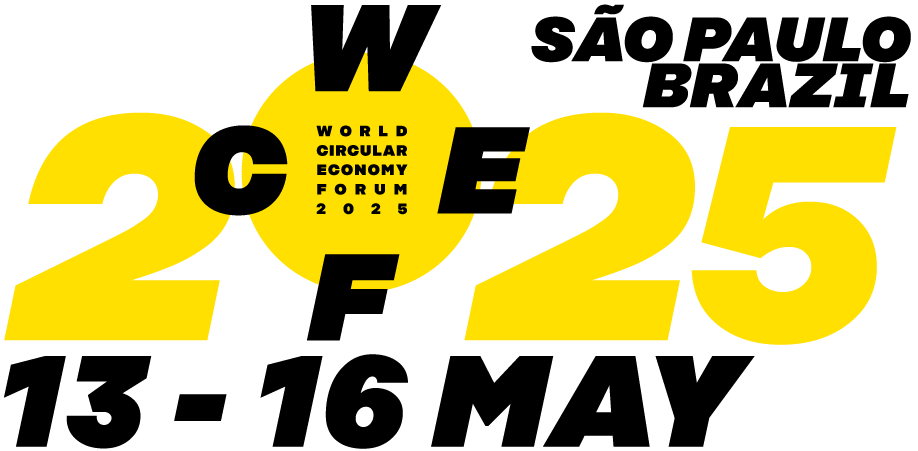Media
Are you a journalist or a media outlet representative?
Accreditation for on-site participation the main event at São Paulo, Brazil is now closed.
Online participation is still possible, the participants of the media need to be register via this form.
Media kit and press releases
Here you can find background information on the circular economy and the World Circular Economy Forum. You’ll find story ideas, contact information of experts for your interviews as well as recommended readings.
Published press releases so far:
- Top circular economy event tackles rising material scarcity (28 April 2025)
- Top event highlights circular solutions to refine growth targets and sustainability agreement (06 February 2025)
- WCEF2025 to be held in Brazil (16 April 2024)
More resources
Looking for professional images of the forum? Or ideas for stories? Click below to discover more.
Content will be uploaded every day at 12:30 and then through the day until 17:30
Contact
If you have any questions regarding the forum’s media relations or need help in organising interviews, please contact our media team.
Releases of reports and briefings
Mon 10 April, highlights will be presented at accelerator session “Unlocking circular value chains across Europe and Asia Pacific” (Thu 15 May 06:30 BRT)
[Introduction] Report: Embracing a circular economy for a resilient tomorrow: Reinventing Asia Pacific
PwC report: Circular economy could boost Asia Pacific’s GDP by $340B, cut emissions by 7.2% and add 15M jobs.
A shift from today’s linear “take, make, waste” model is crucial to tackling climate change, pollution, and biodiversity loss. Asia Pacific, responsible for nearly half of global emissions, faces risks to growth, manufacturing, and quality of life. PwC analysis finds 33% of the region’s economy will see significant change. Key sectors:
- MRO: GDP up 13x, driven by repair & reuse.
- Recycling: GDP up 5x, shifting from virgin to recycled materials.
- Construction: GDP up 21%, fueled by circular infrastructure.
Some industries, like mining and chemicals, could see declines but must adapt to circular models. PwC outlines a five-step approach for businesses to transition successfully.
More information: Natalia Lopez, natalia.ll.lopez@pwc.com
Tue 13 May 12:40 BRT at the extra session “CGR 2025: We can’t recycle our way out of this”
[Release] Report: Circularity Gap Report (CGR®) 2025
CGR® 2025 by Circle Economy: We can’t recycle our way out of this For seven years, we measured global circularity with just one metric. In 2015, the world was 9.1% circular. By 2021, that number had dropped to 7.2%. Clearly, we’re heading in the wrong direction. To understand why – and what needs to change— we need a more complete picture. This year’s report introduces a comprehensive dashboard of 11 indicators to provide a fuller picture of global circularity.
Find out more at circularity-gap.world/2025
Tue 13 May 12:40 BRT at the extra session “CGR 2025: We can’t recycle our way out of this”
[Announcement] Report: Circularity Gap Report (CGR®) Brazil
How circular is Brazil? Find out in the upcoming CGR® Brazil by Circle Economy Circle Economy is proud to conduct research into the state of circularity of Brazil. The report will be launched at COP 30 in Brazil. Learn more at https://www.circularity-gap.world/.
Note: this announcement will be made during the launch of CGR 2025.
Tue 13 May 12:40 BRT release at the extra session “CGR 2025: We can’t recycle our way out of this”
and Thu 15 May 15:00 BRT workshop at the accelerator session “Accelerating action with the circularity gap dashboard“
[Release] Tool: CGR® Dashboard
Accelerating circular action with CGR® Dashboard by Circle Economy
Together with the CGR 2025, Circle Economy will launch the CGR® Dashboard—a database unlocking the millions of data points collected since the annual report’s inception, with the aim of democratising circularity data to enable policymakers, business leaders and changemakers worldwide to make informed decisions.
Wed 14 May at 11:30 BRT at the session “Circular bioeconomy approaches for food security and resilience“
[Release] Report: Navigating the Paradox of Food Loss and Waste
WPO and UNIDO will launch the publication “Navigating the Paradox of Food Loss and Waste.” The purpose of this position paper, jointly authored by the United Nations Industrial Development Organization (UNIDO), Wageningen University & Research (WUR) and the World Packaging Organisation (WPO) is to explore the intricacies of the food loss and waste paradox, delving into the challenges, opportunities and potential solutions that lie at the intersection of food loss and waste and food packaging sustainability.
This collaborative effort leverages the diverse expertise and perspectives of these esteemed institutions to provide a nuanced understanding of the complexities involved in achieving a sustainable and resilient global food system. By unraveling these intricacies, we seek not only to inform but to inspire actionable solutions that resonate across sectors, borders and industries.
Contact: Luciana Pellegrino, President of WPO World Packaging Organisation, l.pellegrino@worldpackaging.org
Thu 15 May 6:30 BRT at the accelerator session “The RESCUE Initiative in the ECO Region: Goals, Opportunities, and Challenges“
[Release] Report: The UNIDO-ECO Needs Assessment under the RESCUE Initiative
The Economic Cooperation Organization (ECO) is proud to announce the launch of the joint UNIDO-ECO Circular Economy Needs Assessment study under the framework of the Regional Initiative on Resource Efficiency, Sustainability, and Circular Economy in the ECO Region (RESCUE, pdf), aimed at promoting sustainable development and circular economy practices across the ECO region.
This initiative seeks to address environmental challenges by fostering collaboration among member states, sharing best practices, and implementing innovative solutions to reduce waste and enhance resource efficiency. Join us on 15 May to explore the goals, opportunities, and challenges of the RESCUE Initiative, and learn how it aims to transform the ECO region’s approach to sustainability.
More information: Vera Kowalkowska, v.kowalkowska@unido.org
Thu 15 May 2025 at 8:00 at the accelerator session “Circularity in the built environment: From measurement to policy and practice“
[Release] Platform: 10 Whole Life Cycle Recommendations for the Buildings Breakthrough case study platform
This case study platform collects practical examples of the implementation of the thematic areas of the 10 Whole Life Cycle (WLC) Recommendations on how whole life cycle and circularity considerations underpin the Buildings Breakthrough Priority Actions and the objective of making near-zero emission and resilient buildings the new norm by 2030. The platform provides concrete guidance for national and local implementation while also serving as a source of inspiration, encouraging new projects through intuitive filtering and visually engaging case study profiles.
The 10 WLC Recommendations for the Buildings Breakthrough were developed in 2024 by the GlobalABC Materials Hub (co-hosted by the GlobalABC, the One Planet Network, the Life Cycle Initiative, and the Costa Rica Green Building Council) and its two parallel working groups Whole Life Cycle Policy Coalition (led by the UK’s DESNZ and WBCSD) and Circular Built Environment (led by MoE Finland and RMIT university from Australia).
Thu 15 May 2025 at 8:00 at the accelerator session “Circularity in the built environment: From measurement to policy and practice”
[Release] Listing: Actions’ Menu of the Global Framework for Action: Harnessing sustainable and circular public procurement to drive demand for near-zero emission and resilient buildings
The Actions’ Menu by One Planet Network at UNEP provides a list of actionable strategies to support national and local governments as well as other key actors in the construction value chain to implement circular strategies to achieve the goals of a near-zero emission and resilient built environment.
Contact: Emma Lappalainen, emma@finngroup.org
Thu 15 May 2025, 11:00 BRT at the accelerator session “Cities tackle single-use and promote reusable packaging“
[Release] Reports: Packaging Reuse at Events: Portfolio of Case Studies (update) and Circular City Labs – Innovative Solutions and Good Practices of Reusable Packaging Systems”
ICLEI’s updated publication ”Packaging Reuse at Events: Portfolio of Case Studies” presents eight inspiring case studies demonstrating how municipalities have successfully integrated reusable cups and/or tableware into events. They showcase how strategic planning, stakeholder mobilisation, development of guidance and awareness raising can transform events into zero-waste models that can be replicated and upscaled. Additionally, they emphasise the importance of tailored solutions, consistent efforts and leveraging data to drive measurable outcomes.
ICLEI launches a new publication “Circular City Labs – Innovative Solutions and Good Practices of Reusable Packaging Systems”. Reusable packaging systems are emerging all over the world in an effort to tackle the root cause and prevent waste and emissions by replacing single use materials. The project Circular City Labs (CCL), implemented by GIZ on behalf of the German Ministry for Economic Cooperation and Development (BMZ), supports the reuse journey of businesses and municipalities in Medellín (Colombia), Tbilisi (Georgia), Tirana (Albania) and South Africa.
Also the updated brochure ”Good Practices for Reusable Packaging Systems” is showcasing a collection of international good practices of reuse systems including examples across sectors like food and beverages, transport and e-commerce as well as municipal reuse initiatives and networks. The brochure will highlight the innovative reusable packaging solutions developed by participating businesses in the Circular City Labs.
More information: Dr Magash Naidoo, magashen.naidoo@iclei.org
Thu 15 May 2025, 11:15 BRT at the accelerator session “The Frisian Model: Launching a regional monitoring system“
[Release] Monitoring blueprint: Friesland launches first-of-its-kind regional circular economy monitor
Circular Friesland Association and Circle Economy will launch a first-of-its-kind regional monitor for the circular economy. Based on Circle Economy’s renowned Circularity Gap Report (CGR) method, the monitor enables regions to measure their circular performance and showcase best practices. It provides a clear benchmark for other regions aiming to track progress toward a circular economy.
With this launch, Friesland emphasises the crucial role of the regional scale in driving the circular transition. By making circular progress visible at this level, Friesland aims to spark collaboration and inspire other regions worldwide to learn from each other, exchange best practices and jointly speed up the shift to a circular future.
Contact: Johan Lakke, johan.lakke@circulairfriesland.frl
Fri 16th May 09:00 BRT at the accelerator session “Boundaries and scope setting in the circular economy“
[Launch] Framework: Circular Economy Boundary Setting
Setting boundaries for impact: Introducing the Circular Economy Boundary Framework
As the world seeks clarity and consistency in circularity reporting, the Circular Economy Boundary Framework (CEBF) offers a breakthrough. Developed by Deloitte and Circle Economy Consulting, this evolving framework gives businesses a structured, standardised approach for companies to measure and report circularity—much like emissions are tracked through scopes. By simplifying complexity and aligning circularity efforts across sectors, the CEBF supports more effective strategy, investment, and reporting.
Fri 16 May 2025, 14:00 BRT at the accelerator session “Towards circularity: Policies, innovation and business experiences in Brazil“
[Launch] New programme: Climate and Biodiversity Action through Circular Economy Solutions (CB-ACES)
At this session, UNIDO will announce the start of the preparation phase for a new programme – Climate and Biodiversity Action through Circular Economy Solutions (CB-ACES). The programme seeks to address the challenges of climate change and biodiversity loss by fostering a just transition to a circular economy. In the partner countries Brazil, India, Mexico and South Africa, it will develop and implement circular solutions across key sectors and associated global value chains.
CB-ACES is designed to generate positive impact by combining policy support with knowledge sharing, capacity building, business model development and investment facilitation. Financed by the International Climate Initiative (IKI) of the German Government, the project has just started its preparatory phase and will enter the 5-year implementation phase in early 2026.
More information: Jerome Stucki, UNIDO, j.stucki@unido.org


